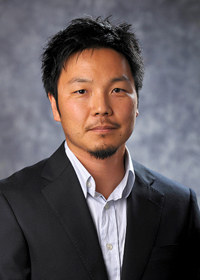Shaun Lee and Rebecca Wingert, assistant professors in the Department of Biological Sciences at the University of Notre Dame, have been selected as recipients of the highly competitive National Institutes of Health (NIH) director’s New Innovator Award. Each award covers $1.5 million in research expenditures over five years.
The award, which encourages creative ideas in science, stimulates highly innovative research and supports promising new investigators. Lee and Wingert are part of a small group of only 49 exceptionally creative, early stage investigators who propose bold new approaches that have the potential to produce a major impact on a broad area of biomedical or behavioral research.
“I am delighted to have two such awards in one year,” says Gregory Crawford, dean of the College of Science. “We’re so proud of the leadership of our young faculty. Rebecca and Shaun are great examples of innovative research. The award testifies to the strength of their basic research in areas so closely aligned to our mission.”

Lee, a member of the Eck Institute for Global Health, is recognized for his innovative work in the design and use of bacteriocins. Lee’s research has led to the discovery of a new class of bacteriocins that are produced by a diverse array of organisms, including several important human bacterial pathogens such as Group A Streptococcus, Staphylococcus, Listeria and Clostridium botulinun. Bacteriocins are ribosomally synthesized toxins that function as antibiotics. Research on these bacteriocins holds valuable promise for new classes of antibiotics, and as targets for vaccine research.
“What we’ve discovered is that many microorganisms, from Cyanobacteria to Archaea, share a common way of making peptide compounds that are highly active,” Lee says, adding that Notre Dame’s Center for Rare and Neglected Diseases also has supported the work. “Many of these compounds, called bacteriocins, seem to have a wide variety of activities – from cytotoxins to antibiotics and anti-infectives. The more knowledge we gain about how the microorganisms engineer these compounds, the greater the hope that we can use this knowledge to design and develop the next generation of antibiotics and anti-infective agents.” Lee came to Notre Dame in 2009 as part of the Strategic Research Investment in genomics, disease ecology and global health.
Wingert is recognized for her highly innovative work on the identification of kidney regeneration mechanisms. Wingert’s research focuses on how the human kidney regenerates nephron cells, a potential solution to devastating kidney diseases that destroy the nephron, the organ’s basic functional unit. Her laboratory is studying nephron cell regeneration in zebrafish, whose kidneys are similar to human kidneys. Understanding of the molecular workings of the process could help design treatments for kidney disease in humans.

“The New Innovator Award provides tremendous funding support over the next five years—I feel blessed with having this amazing opportunity to forge ahead with our work on kidney regeneration, and confident that we will make critical strides forward as a result,” said Wingert.
“I am delighted to be pursuing this line of research at the University of Notre Dame. Notre Dame provided me with a unique niche in which to assemble the scaffolding for this new research program: it was through the generous support from the College of Science and Department of Biological Sciences that I was able to create a cutting-edge laboratory, buoyed by the excellent staff of the Center for Zebrafish Research that provides top-rate research support,” Wingert says. "I am inspired everyday by the excitement and passion of the undergraduate and graduate students who have made my lab a special place for the pursuit of knowledge.”
“The NIH Director’s Award programs reinvigorate the biomedical work force by providing unique opportunities to conduct research that is neither incremental nor conventional,” said James M. Anderson, M.D., Ph.D., director of the Division of Program Coordination, Planning and Strategic Initiatives at the NIH. “The awards are intended to catalyze giant leaps forward for any area of biomedical research, allowing investigators to go in entirely new directions.”
Support from the NIH allows Lee and Wingert to pursue highly innovative research that has the potential for unusually high impact to propel these fields forward and speed the translation of research into improved health for the American public. The NIH expects to make competing awards of approximately $117.5 million to the New Innovators in Fiscal Year 2011. Since the program’s inception in 2007, the NIH Director’s Award Program has funded a total of 216 New Innovator Awards, including these 49 new awards.
Contact: Shaun Lee, 574-631-7197, lee.310@nd.edu; and Rebecca Wingert, 574-631-0907, rwingert@nd.edu